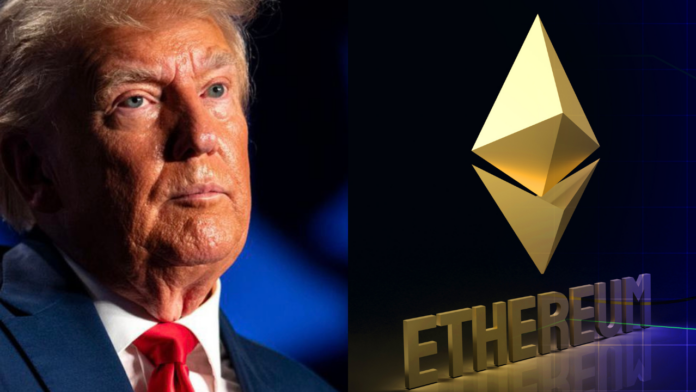In a stunning twist, former U.S. President Donald Trump has been revealed to hold a substantial amount of Ethereum (ETH), with official documents shedding light on his foray into the cryptocurrency world. This revelation comes as a surprise, given Trump’s previous stance as a crypto skeptic during his time in office. The disclosure, made by the governmental ethics watchdog Citizens for Responsibility and Ethics in Washington, has unveiled that Trump possesses $2.8 million worth of Ethereum in his cryptocurrency wallet as of early August.
However, Trump’s involvement in the crypto realm doesn’t end with his Ethereum holdings. The former president’s recent financial disclosures have also unveiled his impressive earnings from the world of non-fungible tokens (NFTs). The filing indicates that Trump earned a staggering $4.87 million in licensing fees from his NFT collection, which he debuted last year. The collection, titled “Trump Digital Collectible Cards,” featured unique NFTs bearing images of the former president himself. The project proved to be a remarkable success, as both the initial release and a subsequent series in April sold out rapidly.
Trump’s swift pivot from crypto skeptic to active participant in the NFT space raises questions about the evolving dynamics of cryptocurrency adoption among public figures and political figures. The former president’s endorsement of NFTs, combined with his sizeable Ethereum holdings, indicates a significant shift in his perspective on the digital asset landscape.
This revelation comes at a moment of heightened attention on cryptocurrencies in the political sphere, particularly as the U.S. gears up for the presidential election in 2024. As the race gains momentum, cryptocurrencies are making their way into the policy platforms of candidates from both major parties. Democratic hopeful Robert F. Kennedy Jr. has not only confirmed his ownership of Bitcoin (BTC), but he has also proposed a bold plan to back the U.S. dollar with BTC and exempt the cryptocurrency from capital gains taxes if elected.
On the Republican side, Trump faces competition from Florida Governor Robert DeSantis, who is trailing in early polls. DeSantis has taken a strong stance against central bank digital currencies (CBDCs), promising to ban them if he secures the presidency. This positions the cryptocurrency debate as a central theme in the upcoming election, where candidates are vying not only for political power but also for influence over the future of digital finance.
Donald Trump’s unexpected cryptocurrency holdings and NFT ventures underscore the growing significance of digital assets in both the financial and political realms. As the 2024 presidential election looms on the horizon, the embrace or rejection of cryptocurrencies is becoming a defining factor in candidates’ platforms and a decisive issue that could shape the future of the United States’ economic landscape.


